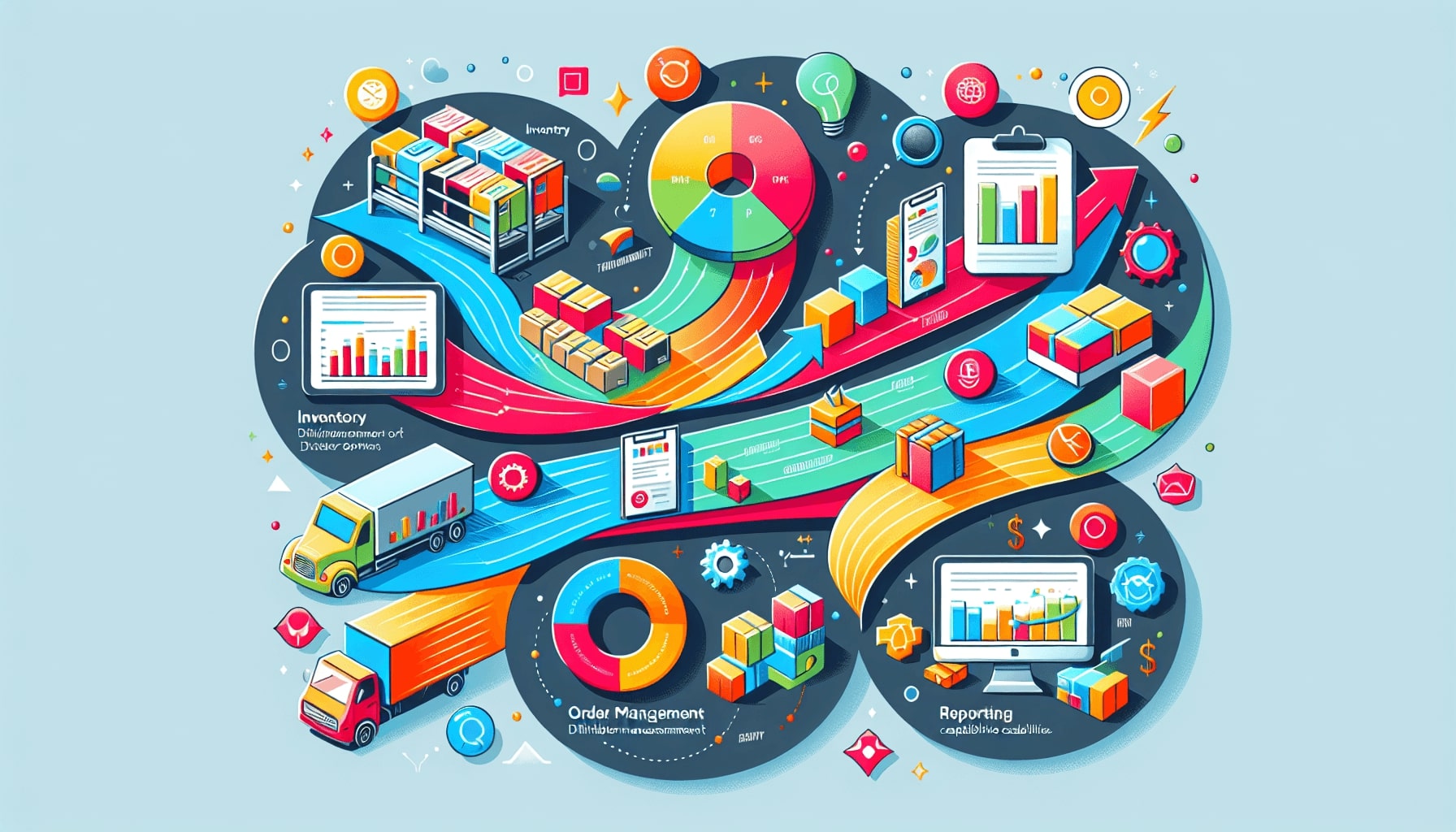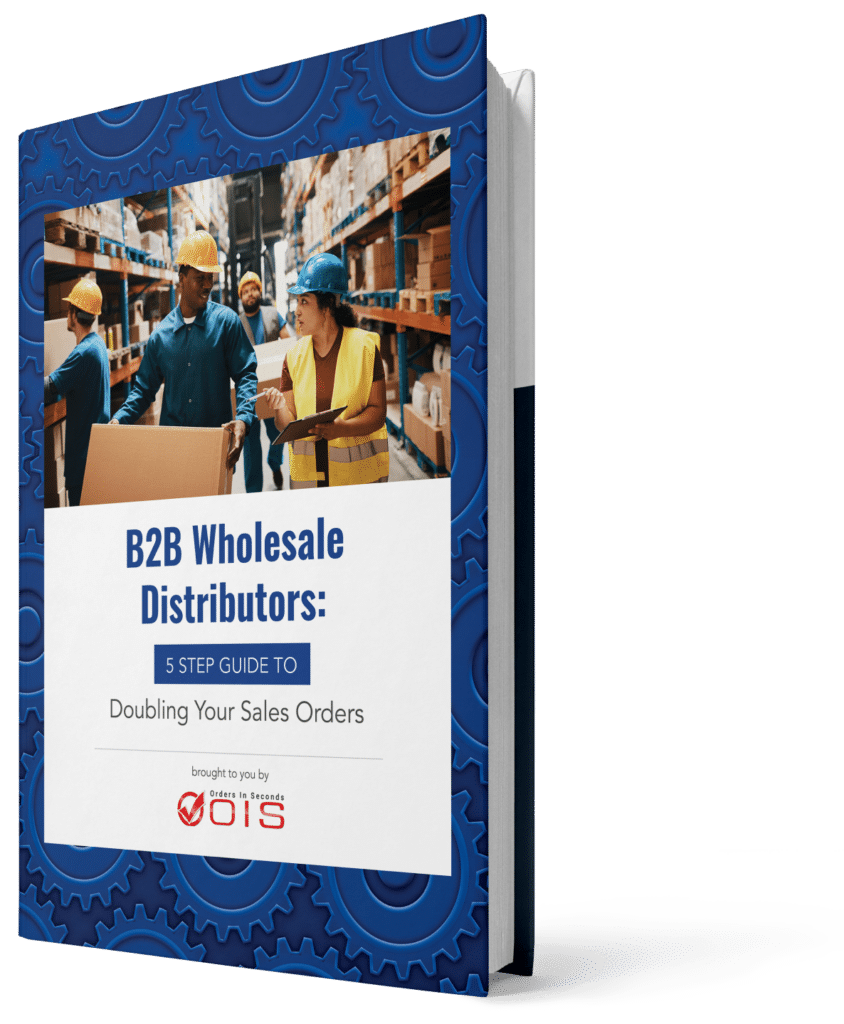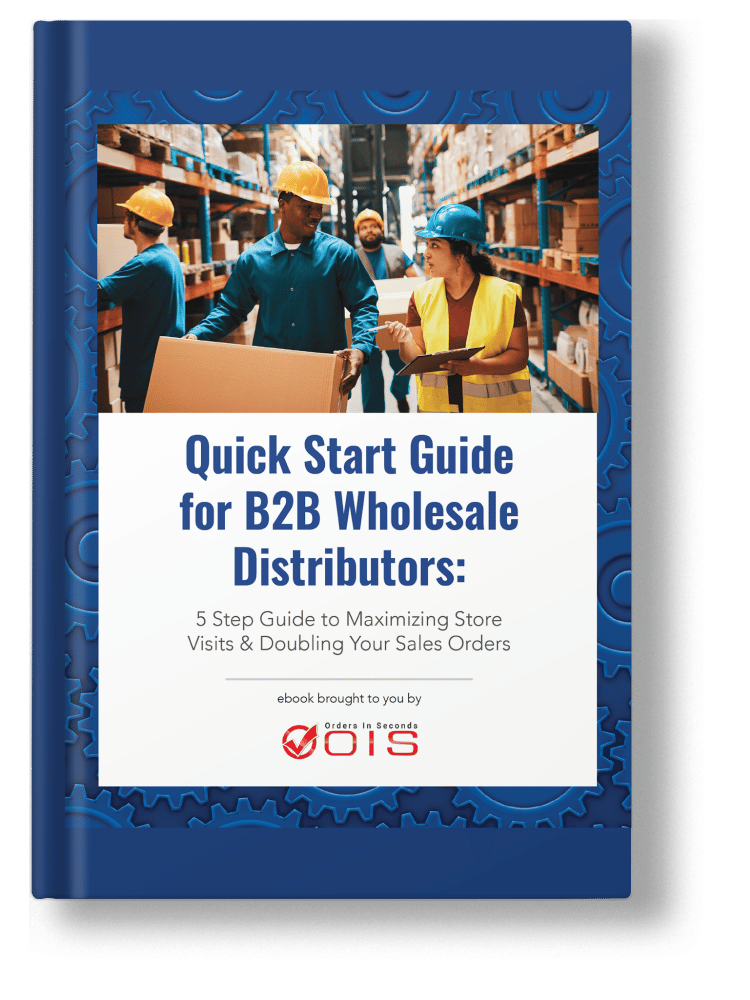Key Takeaways
Looking for the best software for distributor management? This guide will help you discover the top tools to streamline your operations, improve accuracy, and boost efficiency. Read on to learn about their benefits, key features, and how to choose the right one for your business.
- Distribution management software significantly enhances operational efficiency by automating tasks, improving accuracy in order processing, and streamlining inventory management.
- Key features of distributor management software include order management, real-time inventory visibility, CRM integration, and advanced analytics capabilities that drive better decision-making.
- Choosing the right software involves considering scalability, integration options, and tailored modules, ensuring it aligns with business goals and improves overall performance.
Table of Contents
- Benefits of Distribution Management Software
- Key Features of Distributor Management Software
- Choosing the Right Software for Your Wholesale Distribution Business
- Enhancing Inventory Management with Advanced Tools
- Streamlining Order Processing for Better Customer Satisfaction
- Real-Time Data for Informed Decision-Making
- Improving Sales Performance with Distribution Software
- Financial Management and Accounting Integration
- Supply Chain Planning and Execution
- Leveraging AI and Machine Learning in Distribution Management
- Case Studies: Success Stories in Wholesale Distribution
- Summary
- Frequently Asked Questions
- Discover the Top Apps to Streamline Distribution
Benefits of Distribution Management Software

Distribution management software introduces significant efficiency to distribution businesses. By automating repetitive tasks that previously consumed hours, your team can concentrate on more strategic activities. It boosts operational efficiency by simplifying complex pricing structures and ensuring smooth business operations for distribution companies, enhancing overall exclusive distribution operations.
The accuracy of operations improves significantly with the use of distribution management software. Increased accuracy means fewer errors in order processing, inventory management, and customer interactions. This precision optimizes business operations, reduces waste, and maximizes resources, supporting profitable and growth-oriented activities to help your business thrive in a competitive industry.
The software’s efficient management of various processes significantly enhances overall business performance. From inventory management to customer relationship management, every aspect of your distribution business can be fine-tuned for better results. This holistic approach keeps your business aligned with its goals and maximizes profitability.
Key Features of Distributor Management Software

Distribution management software is powerful due to its extensive feature set that supports the entire distribution lifecycle. A key feature is the order management module, which consolidates data from all order sources into a single catalog for easy access. This consolidation simplifies order processing and reduces errors, ensuring efficient handling of orders. Mobility solutions for Salesforce automation also ensure orders are processed accurately and on time, enhancing operational reliability.
Inventory management offers real-time visibility over stock levels, shipments, returns, and adjustments. Effective inventory control helps avoid overstocking and stockouts, preventing supply chain disruptions and maintaining customer satisfaction. The software’s ability to auto-populate order details and track inventory in real-time ensures that you always have up-to-date information at your fingertips.
Real-time reporting and customer relationship management (CRM) features are integral to the software. These capabilities provide insights that enhance operational efficiency and support effective decision-making. CRM features ensure seamless engagement with customers, tracking interactions, and maintaining strong relationships.
This comprehensive feature set ensures that your distribution business operates smoothly and efficiently, from order management to customer service.
Software for Office Products Dealers
Office products dealers can benefit greatly from specialized software to streamline their operations and improve efficiency. Here are some key types of software:
- Cloud-based wholesaler business software: This type of software provides a comprehensive solution for managing all aspects of a wholesale business, including inventory, sales, purchasing, and customer relationships.
- Manufacture distribution software: For dealers involved in manufacturing or distribution, this software helps manage the entire supply chain, from raw materials to finished products.
- Wholesaler business management software: Similar to cloud-based software, this focuses on managing the day-to-day operations of a wholesale business, including order processing, invoicing, and reporting.
- Distribution CRM tool: A customer relationship management tool specifically designed for distributors helps manage customer interactions, track sales opportunities, and improve customer satisfaction.
- Distributor order entry software: This software streamlines the order entry process, reducing errors and improving efficiency.
- Manage a distribution operation efficiently: By utilizing the right software tools, distributors can optimize their operations, reduce costs, and improve customer service.
Choosing the Right Software for Your Wholesale Distribution Business

Choosing the right distribution management software is crucial for any wholesale distribution business. The software should align with your specific business goals and be scalable to accommodate future growth. It’s essential to choose a solution that can be tailored to meet your unique needs, allowing you to purchase only the modules that are necessary for your operations. Additionally, implementing wholesale distribution software can enhance efficiency and streamline processes.
One important consideration is whether to opt for on-premise or cloud-based software. Cloud-based solutions offer greater accessibility and easier integration with other systems, making them a popular choice for many businesses. However, on-premise solutions may be preferable for companies with specific security or regulatory requirements. Your budget, the features offered, scalability, and the availability of customer support are all crucial factors to consider when making your choice.
Ultimately, the right distribution management software will provide the tools you need to optimize your business operations, improve efficiency, and drive growth. By carefully evaluating your options and selecting a solution that fits your business, you can ensure that your operations are well-supported and poised for success.
Enhancing Inventory Management with Advanced Tools
Effective inventory management is the backbone of any successful distribution business. Distribution management software offers advanced tools that provide real-time visibility into stock levels, helping to prevent issues of overstocking or understocking. This visibility allows businesses to maintain optimal inventory levels, ensuring that products are always available to meet customer demand without tying up excessive capital in inventory.
The software also offers complete control over stocks, with features such as automatic reordering and sales insights. Automated low-stock alerts help businesses respond promptly to inventory needs, minimizing the risk of stockouts. These tools ensure that your inventory is managed efficiently, reducing the time and effort required to monitor and adjust stock levels manually.
Quality control is another critical aspect of inventory management that is strengthened by distribution software. The ability to track inventory issues as they arise ensures that any problems are addressed promptly, maintaining the quality and reliability of your products. With these advanced tools, your business can stay ahead of inventory challenges and optimize operations for better performance.
Software Distribution Tools
Software distribution tools are essential for delivering software applications to end-users. Here are some common types:
- Verification successful waiting: This message indicates that the software distribution process is complete and the user can proceed.
- Software distribution tools: These tools help manage the entire software distribution process, from packaging and deployment to updates and maintenance.
- Software distribution tool: A single tool that can handle various aspects of software distribution, such as packaging, deployment, and updates.
- Software distribution process: The series of steps involved in delivering software applications to end-users.
- Distribution tool: A generic term for any tool used to distribute software, including installers, patchers, and update managers.
Streamlining Order Processing for Better Customer Satisfaction
Streamlining order processing is key to improving customer satisfaction. By automating the ordering process, distribution management software reduces costly manual errors, ensuring that orders are processed accurately and efficiently. For example, GP Automotive experienced improved order processing speed and reduced manual tasks by adopting Fitrix ERP, highlighting the tangible benefits of automation.
Real-time validation during order processing helps check for pricing and customer information errors instantly, further enhancing accuracy. Distribution One’s order management feature enables seamless processing across multiple warehouses and sales channels, ensuring that orders are fulfilled quickly and reliably. This efficiency translates directly into higher customer satisfaction, as customers receive their orders on time and as expected.
Digitization also plays a crucial role in improving communication with customers. By informing customers about transaction statuses in real-time, businesses can build trust and improve customer relationships. Efficient inventory management through automation prevents overselling, ensuring that products are always available when customers need them. These streamlined processes lead to better service levels and higher customer satisfaction.
If mistakes are holding back your wholesale distribution business, download our free eBook “Avoid the Top 5 Mistakes Wholesale Distributors Make” and discover key strategies to optimize your operations for success!

Avoid the Top 5 Mistakes Wholesale Distributors Make
Real-Time Data for Informed Decision-Making
Access to real-time data is crucial for making informed decisions in the fast-paced world of wholesale distribution. Real-time insights can significantly improve forecasting and demand planning, allowing businesses to anticipate market trends and adjust their operations accordingly. This proactive approach ensures that resources are allocated efficiently, and potential issues are addressed before they escalate.
Real-time information sharing enhances data analysis and reporting, providing a clear and accurate picture of business performance. This capability supports data-driven decisions, enabling businesses to respond swiftly to changes in the market or operational challenges. Timely data access is essential for maintaining operational efficiency and staying competitive in the wholesale distribution industry.
Advanced analytics powered by AI can transform raw data into actionable insights, helping businesses identify opportunities for improvement and optimize their operations. By leveraging real-time data, wholesale distributors can make informed decisions that drive growth, improve efficiency, and enhance overall business performance.
Improving Sales Performance with Distribution Software

Distribution management software can be a game-changer for improving sales performance. One of the key benefits is the actionable insights provided by the software, which can enhance productivity and sales performance. Sales force automation functionalities, such as order taking, payment collection, receipt creation, and billing, streamline complex sales processes and allow the sales team to focus on closing deals.
For instance, Gofrugal’s software has been shown to increase gross profit from 16% to 21%, demonstrating its significant impact on profitability and business growth. The ability to plan and track field sales routines effectively can also lead to improved overall sales performance, as it ensures that sales teams are working efficiently and targeting the right opportunities.
By providing the tools and insights needed to optimize sales processes, distribution management software enables businesses to enhance their sales performance, drive growth, and improve their bottom line. This comprehensive approach ensures that every aspect of the sales process is managed effectively, leading to better results and higher profitability.
Financial Management and Accounting Integration
Integrating financial management and accounting systems with distribution management software is essential for smooth and efficient business operations. Seamless integration with existing ERP and accounting systems automates finance processes, minimizing errors and speeding up activities such as invoicing and financial reporting. This integration ensures that financial data is accurate and up-to-date, providing a clear picture of the business’s financial health.
Integrated solutions handle complexities like multi-entity management and complex revenue recognition effectively for wholesale distributors. Automated order management and quote-to-cash cycles improve accuracy and efficiency, reducing the workload on finance teams and ensuring that financial operations run smoothly.
Cloud-based financial management solutions offer scalability and remote access, meeting the needs of a distributed workforce and ensuring that financial data is accessible from anywhere. This flexibility is crucial for businesses looking to stay agile and responsive in a dynamic market. By integrating financial management systems with distribution software, businesses can achieve complete control over their finances, reduce costs, and optimize their overall business performance.
Supply Chain Planning and Execution
Supply chain planning and execution are critical components of a successful distribution business. Distribution management software supports these processes by improving collaboration, reducing lead times, and enhancing overall efficiency. Advanced inventory management tools automate processes like reordering and tracking, ensuring that inventory levels are optimized and stockouts are avoided.
The software also supports multi-warehouse management, enabling businesses to track inventory across various locations and streamline their operations. Supplier management features facilitate real-time communication with suppliers and logistics partners, ensuring that supply chain disruptions are minimized and operations run smoothly.
Integrating order management with shipping carriers allows for streamlined label printing and cost-effective shipping solutions, further enhancing supply chain efficiency. AI-driven supply chain visibility helps streamline operations and reduces delays in logistics, ensuring that products are delivered on time and as expected.
By leveraging these tools, businesses can optimize business operations, improving service levels and mitigating risks.
Leveraging AI and Machine Learning in Distribution Management

AI and machine learning are transforming the wholesale distribution industry by boosting efficiency and optimizing business outcomes. AI systems analyze large datasets to provide real-time insights for demand and supply planning, enhancing decision-making and operational efficiency. Machine learning algorithms predict demand and optimize inventory levels, ensuring that products are available when needed without overstocking.
In addition to demand forecasting, AI and machine learning can optimize transportation routes, reducing fuel consumption and improving delivery efficiency. These technologies also enhance customer interactions by automating processes and providing insights into buying behavior and preferences, leading to better customer engagement and satisfaction.
By leveraging AI and machine learning, wholesale distributors and the wholesale distribution company can streamline processes, improve accuracy, and make data-driven decisions that drive growth and profitability. These advanced technologies are essential for staying competitive in a dynamic market and ensuring that operations are always optimized for success.
Case Studies: Success Stories in Wholesale Distribution
Real-world success stories demonstrate the tangible benefits of implementing distribution management software. For instance, Colorado Industrial Packaging achieved a 4% increase in profit margin by implementing Distribution One ERP, highlighting the measurable success in their operations. Similarly, Veridian Healthcare selected Fitrix ERP for its extensive functionality and cost-effectiveness, leading to significant operational improvements.
Subash’s experience with Gofrugal software underscores the importance of excellent support and comprehensive features in software selection. These success stories illustrate how distribution management software can enhance operational efficiency, profitability, and overall business performance for wholesale distributors.
The importance of dependable support and all-encompassing features is paramount for businesses striving for expansion and operational efficiency. By analyzing practical examples of successful implementations, organizations can gain a deeper understanding of the considerable advantages offered by distribution management software and make well-informed choices regarding their own operational strategies.
To further enhance distribution efforts and identify potential avenues for growth, access to a detailed list of retail stores can provide invaluable insights into market reach and potential partnerships. This allows businesses to strategically plan their distribution network and identify key retail outlets.
Summary
In summary, distribution management software offers a wealth of benefits that can transform your wholesale distribution business. From enhancing inventory management and streamlining order processing to providing real-time data for informed decision-making, these tools are essential for optimizing business operations and driving growth. The integration of financial management systems and the use of AI and machine learning further enhance the capabilities of these software solutions.
By learning from real-world success stories and carefully selecting the right software for your business, you can ensure that your distribution operations are efficient, accurate, and profitable. Embrace the power of distribution management software and unlock the full potential of your wholesale distribution company.
Frequently Asked Questions
Distribution management software significantly enhances operational efficiency and accuracy, while optimizing processes to support profitable business growth. These benefits collectively drive superior performance in distribution management.
Distributor management software should include order management, inventory control, real-time reporting, and customer relationship management to effectively streamline operations and improve efficiency. These features are vital for meeting business demands and enhancing customer satisfaction.
How do I choose the right distribution management software for my business?
The right distribution management software should align with your specific business goals while considering scalability, budget, and whether you prefer on-premise or cloud-based solutions. Prioritize features that cater to your operational needs to ensure effective management.
Distribution management software enhances inventory management by offering real-time visibility into stock levels, automating reordering processes, and issuing low-stock alerts, thereby optimizing inventory and reducing the risk of stockouts.
AI and machine learning enhance distribution management by analyzing large datasets to optimize demand forecasting, inventory levels, and transportation routes, ultimately leading to improved efficiency and better customer interactions.
Discover the Top Apps to Streamline Distribution
Optimize every step of your distribution process with Orders in Seconds (OIS) Apps. Whether you need seamless order taking, an efficient eCommerce platform, precise order picking in your warehouse, or streamlined delivery management, OIS has you covered. With real-time tracking and automation at your fingertips, you can enhance accuracy and boost productivity across all areas of your business. Ready to transform your operations?
Schedule a free demo today and start streamlining your entire workflow!
Distributor Management System (DMS)
A Distributor Management System (DMS) is a software solution that streamlines and automates various aspects of the distribution process. It helps businesses manage their relationships with distributors, track orders, monitor inventory, and analyze sales data.
Distribution Management System Software
DMS software encompasses a range of features, including:
- Order Management: Efficiently processing orders from distributors, tracking order status, and managing order fulfillment.
- Inventory Management: Monitoring stock levels, tracking inventory movement, and minimizing stockouts or overstocking.
- Sales Force Automation: Automating sales tasks, such as lead generation, customer relationship management, and sales forecasting.
- Channel Management: Managing relationships with distributors, setting sales targets, and tracking distributor performance.
- Reporting and Analytics: Generating reports on sales performance, inventory levels, and other key metrics to gain valuable insights into the distribution process.
Automatic Product Distribution System
An automatic product distribution system refers to a system that automates the process of moving products from the warehouse to the point of sale. This can involve automated guided vehicles (AGVs), conveyor belts, and other technologies that minimize manual handling and improve efficiency.
Software Distribution Solutions
Software distribution solutions are systems that facilitate the delivery and deployment of software applications to end-users. These solutions can be used to distribute software updates, patches, and new applications to desktops, laptops, and mobile devices.
Software Packages
Software packages are collections of software programs that are bundled together and sold as a single unit. These packages often include a variety of applications, such as word processors, spreadsheets, and presentation software.
Asset Management
Asset management refers to the process of tracking, managing, and maintaining a company’s assets, which can include physical assets (such as equipment and vehicles) as well as digital assets (such as software licenses and intellectual property).
Key Takeaways:
- DMS is a critical tool for businesses that rely on distributors to reach their customers.
- DMS software offers a range of features to improve efficiency, reduce costs, and enhance customer satisfaction.
- Automatic product distribution systems can significantly improve warehouse operations and reduce labor costs.
- Software distribution solutions ensure that end-users have access to the latest software versions and security updates.
- Software packages offer a cost-effective way to acquire multiple software applications.
- Asset management is essential for maintaining a company’s assets and ensuring their optimal utilization.
Retail Distribution Software
- Definition: Software designed to streamline and optimize the flow of goods from manufacturers or distributors to retailers.
- Key Features:
- Inventory Management: Track stock levels, monitor product movement, and manage replenishment.
- Order Processing: Automate order entry, fulfillment, and delivery.
- Logistics Management: Plan and optimize routes, track shipments, and manage transportation costs.
- Sales & Marketing: Manage customer relationships, track sales performance, and analyze market trends.
Wholesale Distribution Software for Small Business
- Focus: Tailored to the specific needs of small and medium-sized wholesale businesses.
- Key Considerations:
- Affordability: Cost-effective solutions with flexible pricing options.
- Ease of Use: User-friendly interface with minimal training required.
- Scalability: Grows with your business as your needs evolve.
- Integration: Integrates with other essential business tools like accounting and e-commerce platforms.
Distributing Software
- General Term: Refers to any software solution that supports distribution activities, including inventory management, order fulfillment, transportation, and warehouse management.
- Examples:
- Enterprise Resource Planning (ERP) systems: Offer comprehensive functionalities for managing all aspects of a distribution business.
- Warehouse Management Systems (WMS): Focus on optimizing warehouse operations, including inventory tracking and order picking.
- Transportation Management Systems (TMS): Manage transportation planning, routing, and execution.
Distribution Planning Optimization Tools
- Purpose: Help businesses optimize their distribution networks to minimize costs and improve efficiency.
- Key Features:
- Route Optimization: Determine the most efficient routes for delivery vehicles.
- Warehouse Location Optimization: Identify the best locations for warehouses to minimize transportation costs and improve service levels.
- Inventory Optimization: Optimize inventory levels across the distribution network to minimize stockouts and holding costs.
Integrated Sales and Logistics Software
- Benefits:
- Improved Visibility: Provides a single source of truth for all sales and logistics data.
- Enhanced Collaboration: Facilitates better communication and coordination between sales, operations, and logistics teams.
- Increased Efficiency: Streamlines order processing, fulfillment, and delivery.
- Reduced Costs: Optimizes resource allocation and minimizes operational expenses.
Wholesale Distribution Business Software Services
- Cloud-based solutions: Offer flexibility, scalability, and accessibility from anywhere with an internet connection.
- On-premise solutions: Provide greater control and customization but require significant upfront investment and ongoing maintenance.
- Consulting services: Assist with implementation, training, and ongoing support.
Best Distributor Quoting Software
- Key Features:
- Automated Quoting: Quickly generate accurate quotes based on customer requirements and pricing rules.
- Customizable Templates: Create professional and branded quotes.
- Integration with CRM: Seamlessly integrate with CRM systems to access customer data and track quote progress.
- Proposal Generation: Generate professional proposals from quotes.
Sales Reps
- Sales Representatives: Individuals responsible for selling products or services to customers.
- Key Roles:
- Prospecting: Identifying and qualifying potential customers.
- Sales Presentations: Delivering compelling presentations to potential customers.
- Building Relationships: Building and maintaining strong relationships with customers.
- Closing Deals: Negotiating and closing sales deals.
Customer Service Management
- Definition: The processes and strategies used to interact with customers and provide them with support.
- Key Aspects:
- Customer Support: Providing assistance to customers with inquiries, issues, and complaints.
- Customer Relationship Management (CRM): Managing customer interactions and building long-term relationships.
- Customer Experience: Creating positive and memorable customer experiences.
Automates Key Business Processes
- Benefits:
- Increased Efficiency: Reduces manual effort and frees up employees for more strategic tasks.
- Reduced Errors: Minimizes human error and improves accuracy.
- Improved Productivity: Increases output and improves overall business performance.
- Cost Savings: Reduces operational costs by automating repetitive tasks.
Sales and Distribution Channels
- Direct Sales: Selling directly to customers through a sales force.
- Indirect Sales: Selling through intermediaries such as distributors, wholesalers, and retailers.
- E-commerce: Selling products or services online through a company’s website or online marketplaces.
- Retail Stores: Selling products through physical retail stores.
CRM Distribution Software Systems
- CRM (Customer Relationship Management) Systems: Software designed to manage customer interactions and relationships.
- Distribution-Specific Features:
- Channel Management: Track sales performance across different distribution channels.
- Order Management: Manage orders from various channels in a single system.
- Territory Management: Assign territories to sales representatives and track their performance.
Sales Cycle Automation Solution
- Definition: Software that automates various stages of the sales process, from lead generation to closing deals.
- Key Features:
- Lead Scoring: Automatically qualify leads based on predefined criteria.
- Email Marketing Automation: Send automated email sequences to nurture leads.
- Sales Forecasting: Predict future sales based on historical data and current trends.
Exceptional Customer Service
- Key Characteristics:
- Responsiveness: Promptly addressing customer inquiries and concerns.
- Proactiveness: Anticipating customer needs and providing solutions before issues arise.
- Personalization: Providing personalized service to each customer.
- Empathy: Showing understanding and compassion for customer concerns.
- Consistency: Providing consistent levels of service across all touchpoints.
Distributor Management App
A distributor management app is a software solution designed to streamline and automate various aspects of a distribution business. These apps typically include features such as order management, inventory tracking, sales force automation, customer relationship management (CRM), and route planning. They can help distributors improve efficiency, reduce costs, and enhance customer service.
Best Inventory Process Distribution Equipment
The “best” inventory process distribution equipment depends on the specific needs and size of the distribution business. However, some common and valuable pieces of equipment include:
- Forklifts: For efficient loading, unloading, and movement of pallets and heavy goods within warehouses.
- Conveyors: To automate the movement of goods along production lines or within warehouses.
- Pallet jacks: For manual handling of pallets.
- Barcode scanners: To quickly and accurately track inventory.
- Warehouse management systems (WMS): Software that integrates with equipment to optimize inventory flow and storage.
Best Software for FMCG Distributor
Several software options are well-suited for Fast-Moving Consumer Goods (FMCG) distributors:
- SAP Business ByDesign: A comprehensive ERP solution with strong inventory management and distribution capabilities.
- Microsoft Dynamics 365: A cloud-based ERP system that offers a range of modules, including sales, marketing, and inventory management.
- Oracle NetSuite: A cloud-based ERP system with robust features for inventory management, order fulfillment, and financial reporting.
- Zoho Inventory: A user-friendly and affordable inventory management solution with features like purchase order management, barcode scanning, and order fulfillment.
Custom Software for Distribution Business
Custom software is tailored to the specific needs and processes of a particular distribution business. It offers greater flexibility and can be integrated seamlessly with existing systems. However, custom software development can be more expensive and time-consuming than using off-the-shelf solutions.
Load Distribution Software
Load distribution software helps businesses allocate workloads efficiently across different resources, such as servers, computers, or network devices. This can improve performance, prevent bottlenecks, and ensure optimal utilization of resources.
Wholesale Software Provider
A wholesale software provider offers software solutions specifically designed for wholesale businesses. These solutions typically include features such as order management, inventory control, pricing management, and customer relationship management. Examples of wholesale software providers include:
- AbacusData
- BlueCherry
- Cin7
- Ordoro
Inventory Management Software
Inventory management software helps businesses track and manage their inventory levels. These systems can provide real-time visibility into stock levels, automate order processes, and generate reports to help optimize inventory levels and reduce costs.
Inventory Management System
An inventory management system (IMS) is a broader term that encompasses both software and hardware components used to track and manage inventory. This can include barcode scanners, RFID tags, warehouse management systems, and other technologies.
Inventory Data
Inventory data refers to the information collected and stored about a company’s inventory, such as:
- Product information: Product name, description, SKU, and other relevant details.
- Quantity on hand: The current number of units in stock.
- Location: The physical location of the inventory within the warehouse.
- Order history: Past orders, sales, and returns.
- Forecast: Predicted future demand for the product.
Manage Inventory
Managing inventory involves a range of activities aimed at optimizing inventory levels and minimizing costs. This includes:
- Forecasting demand: Predicting future sales to ensure adequate stock levels.
- Ordering and receiving goods: Efficiently placing orders with suppliers and receiving goods.
- Storing and handling inventory: Properly storing and handling inventory to prevent damage and spoilage.
- Tracking inventory levels: Maintaining accurate records of inventory levels using inventory management systems.
- Analyzing inventory performance: Regularly analyzing inventory data to identify areas for improvement.
Inventory Management Systems
Inventory management systems (IMS) are software applications that help businesses track and manage their inventory. These systems can automate many inventory-related tasks, such as order processing, receiving, and shipping. They can also provide valuable insights into inventory levels, sales trends, and other key metrics.
Supply Chain Management
Supply chain management (SCM) is the oversight of all steps involved in the movement and transformation of goods and services, from the point of origin to the point of consumption. It includes the planning, implementation, and control of the supply chain activities to satisfy customer requirements efficiently.





